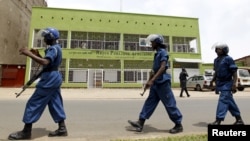Four months after a coup attempt, Burundi’s independent media remain off the air. The population is frustrated and is using social media to try to fill the gap, but often receives rumors in the place of what is actually happening.
On May 13, a group of soldiers attempted to overthrow President Pierre Nkurunziza’s government.
Two days later the coup was foiled and some independent media outlets like Radio Bonesha and Radio Publique Africaine were attacked and burned. Many other stations and newspapers shut down and their staff fled to neighboring countries.
Four and a half months later, the only working radio and TV stations are government-owned.
Meanwhile, officials are investigating the private media for allegedly promoting violence and anti-government messages during the coup attempt and the re-election of the president to a controversial third term.
Antoine Kaburahe, managing director of the Iwacu newspaper, the only remaining independent media outlet in Burundi, says the government prefers having the airwaves to itself.
“The government says that there is an investigation, but we know there is no investigation. Investigation can be done as the media is working, but we are convinced that the government does not like independent media working. So now there is only government media working, radio and television public, but they are not public, they are doing propaganda,” he said.
Hostile environment
Kaburahe says the few remaining journalists are operating in a hostile political environment.
Human rights organizations have warned the journalism field in Burundi has become increasingly dangerous.
The rights groups accuse authorities of denying journalists access to some neighborhoods where the government is cracking down on anti-government protesters.
Bujumbura resident John Batista tells VOA it has been hard to get reliable news and information on what is happening in his country.
“It is very hard to get news in Burundi,” he said. “The only media working is the government-owned radio station and they do not tell exactly what is happening in the country… It is very difficult to get news unless you are at the scene and witness what is happening.”
Burundians have resorted to sharing news through social media, which some blame for further inflaming the situation.
Kaburahe says that is what you get when you shut the media and people have no access to the information.
“There are many rumors of people getting killed or they will be attacks. I think this is the consequences of independent media silence, everybody puts every information on whatsapp whether truth or not and there is fear. Rumors are going on because there is no media,” Kaburahe said.
In August, the New York-based Committee to Protect Journalists and 18 other organizations urged Burundi authorities to investigate attacks on journalists and human rights defenders.
Burundian authorities were not available for comment.




